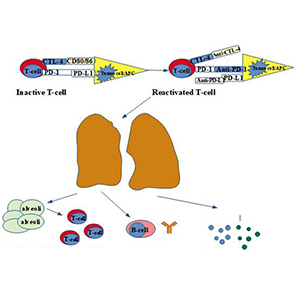Pulmonary adverse events due to immune checkpoint inhibitors: A literature review

Accepted: September 14, 2021
All claims expressed in this article are solely those of the authors and do not necessarily represent those of their affiliated organizations, or those of the publisher, the editors and the reviewers. Any product that may be evaluated in this article or claim that may be made by its manufacturer is not guaranteed or endorsed by the publisher.
Authors
Cancer immunotherapy aims to stimulate the immune system to fight against tumors, utilizing the presentation of molecules on the surface of the malignant cells that can be recognized by the antibodies of the immune system. Immune checkpoint inhibitors, a type of cancer immunotherapy, are broadly used in different types of cancer, improving patients’ survival and quality of life. However, treatment with these agents causes immune-related toxicities affecting many organs. The most frequent pulmonary adverse event is pneumonitis representing a non-infective inflammation localized to the interstitium and alveoli. Other lung toxicities include airway disease, pulmonary vasculitis, sarcoid-like reactions, infections, pleural effusions, pulmonary nodules, diaphragm myositis and allergic bronchopulmonary aspergillosis. This review aims to summarize these pulmonary adverse events, underlining the significance of an optimal expeditious diagnosis and management.
How to Cite

This work is licensed under a Creative Commons Attribution-NonCommercial 4.0 International License.
PAGEPress has chosen to apply the Creative Commons Attribution NonCommercial 4.0 International License (CC BY-NC 4.0) to all manuscripts to be published.
Similar Articles
- Shyam Kanhaiya Saroj, Tushti Bhardwaj, Non-pharmacological interventions for tobacco cessation: A systematic review of existing practices and their effectiveness , Monaldi Archives for Chest Disease: Vol. 92 No. 4 (2022)
- Filiz Çimen, Sevim Düzgün, Sükran Atikcan, Combined SCLC clinical and pathological aspects , Monaldi Archives for Chest Disease: Vol. 93 No. 1 (2023)
- Bhupen Barman, Arvind Nune, Pranav Ish, Pranjal Phukan, Donboklang Lynser, Hem Raj Sapkota, Complete persistent remission of rheumatoid arthritis after COVID-19 infection - A rare case and literature review , Monaldi Archives for Chest Disease: Vol. 93 No. 1 (2023)
- Sam Bartlett-Pestell, James May, Ashutosh Sharma, Sunshine Alonzo, Natalie Barnes , Brendan P. Madden, A 12-year experience in endobronchial intervention using rigid bronchoscopy - account of a tertiary referral centre , Monaldi Archives for Chest Disease: Vol. 92 No. 4 (2022)
- Charalampos Chrysanthos Mylonas, Georgia Gomatou, Garyphallia Poulakou, Eleni Moraitou, Konstantinos Syrigos, Human disease caused by Streptococcus alactolyticus: a case report of native valve infective endocarditis and review of the literature , Monaldi Archives for Chest Disease: Vol. 90 No. 4 (2020)
You may also start an advanced similarity search for this article.

 https://doi.org/10.4081/monaldi.2021.2008
https://doi.org/10.4081/monaldi.2021.2008




